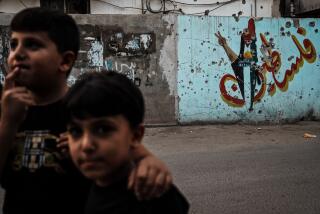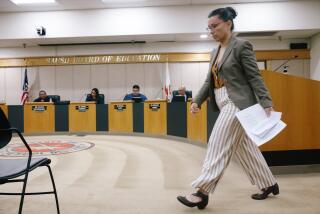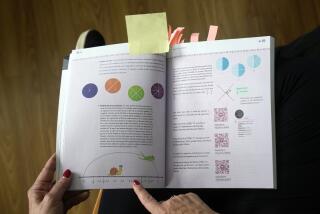Israeli and Palestinian textbooks fail balance test, study finds
- Share via
JERUSALEM – Israeli and Palestinian textbooks get failing grades when it comes to adequately and positively representing each other’s people, culture and history, according to a three-year, U.S-funded study released Monday.
On the bright side, researchers concluded that most schoolbooks on both sides were factually accurate, even though they usually described each other in negative, unflattering terms and typically cast one another as the “enemy.”
Extremely negative material, such as demonization, incitement to violence or depicting the other side as subhuman, were rare in both Israeli and Palestinian books, the report found.
FOR THE RECORD:
Mideast textbooks: In the Feb. 5 Section A, an article about a study of bias in Israeli and Palestinian textbooks said that a Palestinian textbook included a story of a Palestinian who helped rescue a wounded Israeli soldier. The example came from a fourth-grade Israeli textbook. —
Israeli officials, who frequently claim Palestinian textbooks espouse hatred, rejected the study’s conclusions as biased. Palestinian Authority officials said the study vindicated their assertion that their textbooks are as fair and balanced as Israel’s.
The report found both sides lacking in objectivity and balance.
Neither side scored particularly well in geography with 94% of Palestinian textbook maps failing to identify the existence of Israel and 87% of Israeli maps lacking any mention of Palestine or the Palestinian territories.
Neither side’s textbooks devoted adequate attention to the idea of living together in harmony, researchers said.
“Peaceful co-existence ... is completely ignored,’’ said Sami Adwan, a professor at Bethlehem University, who participated in the research with Daniel Bar-Tal, a professor at Tel Aviv University, and Bruce E. Wexler, a senior research scientist at Yale School of Medicine.
Funded with a $500,000 U.S. State Department grant, the project analyzed 94 Palestinian textbooks and 74 from Israel, including some from public state-run schools and some from ultra-Orthodox institutions. Ultra-Orthodox schools have a large degree of autonomy in setting their own curriculum and now instruct nearly one-third of Israeli’s students, the study found.
The research was conducted by Israelis and Palestinians, who cross-checked each other’s work to reduce potential bias. The study was initiated by the Jerusalem-based Council of Religious Institutions of the Holy Land, the Palestinian Authority and various Christian churches. Israel refused to take part.
A negative characterization of “the other” was common in most of the textbooks, though negative portrayals were lowest in Israeli state school textbooks (49%) compared with ultra-Orthodox textbooks (73%) and those in Palestinian schools in the West Bank and Gaza Strip (84%), the study found.
Israeli state school textbooks also included some of the only examples of self-criticism. An 11th-grade civics book recounts the 1948 Deir Yassin massacre as the “killing of dozens of helpless Arabs” and describes the attack as “the central cause of … the Arab exodus from captured Arab settlements.”
Similarly, a 4th-grade Palestinian textbook included a story of a Palestinian who helped rescue a wounded Israeli soldier because, he says in the text, it was “my obligation as a Muslim Arab.”
But such positive examples were the exception, researchers found.
Among the most negative examples were an Israel state school textbook reference to Arabs as “masses of the wild nation,” and ultra-Orthodox textbook descriptions of a “convoy of bloodthirsty Arabs” and a village that was a “nest of murderers.”
A 4th-grade book used in ultra-Orthodox schools called Israel “a little lamb in a sea of seventy wolves,” referring to Arab nations.
Palestinian books also included negative references about the “Zionist occupation,” and the “usurpation of Palestine.” One lesson refers to an Israeli prison as a “slaughterhouse.”
The report found both sets of books carried references to martyrdom and dying for one’s land and liberty.
Israeli officials attacked the study even before it was officially released, insisting that their textbooks were superior to Palestinians’ and should not be compared in the same study.
In a statement, the Ministry of Education called the research “biased, unprofessional and severely nonobjective. ... The attempt at creating parallels between the Israeli and Palestinian education systems is ungrounded and lacks a realistic basis.”
Jerusalem physician Elihu Richter, who served on the advisory panel for the project, said Monday he withdrew his support for the report because he believed the methodology may have undercounted examples of Palestinian incitement.
Researchers defended their project, calling it the most definitive and balanced study to date on the topic. Wexler, the Yale researcher, criticized Israel’s refusal to participate.
“The Ministry of Education appears to be uninterested in facts about what is in the schoolbooks and unencumbered by facts when describing our project,’’ Wexler said.
Palestinian Authority Prime Minister Salam Fayyad praised the report for examining the issue without “preconceived notions and stereotypes.” He said Palestinians would use the findings to help improve their curriculum.
ALSO:
Two Russians and Italian released by Syrian rebels
Scientists identify remains as those of King Richard III
Netanyahu officially asked to put together new Israeli government
More to Read
Sign up for Essential California
The most important California stories and recommendations in your inbox every morning.
You may occasionally receive promotional content from the Los Angeles Times.










